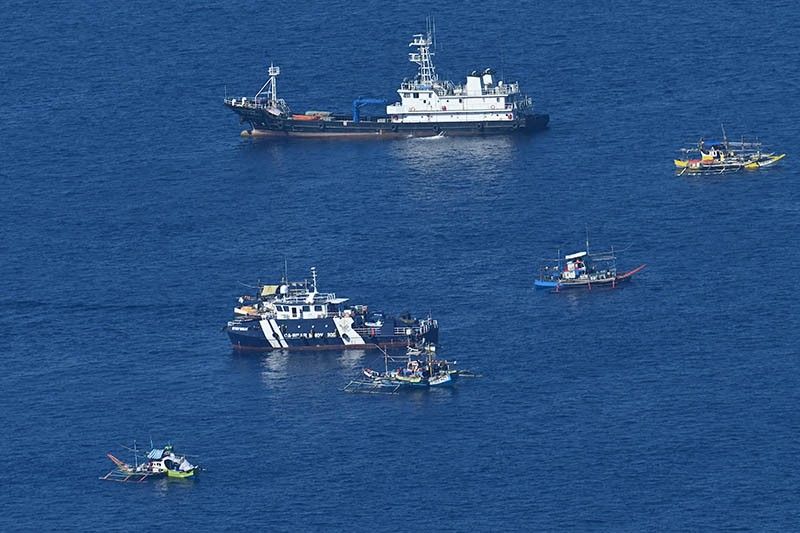Securing economic rights, freedoms in the West Philippine Sea

Filipinos fought hard for independence. The fight of the Filipino is marked by multifaceted challenges and hard-earned victories.
Today, the same freedom is challenged by new threats such as the one we face in the West Philippine Sea.
On Jan. 22, 2013, the Philippines instituted arbitral proceedings against China under the United Nations Convention on the Law of the Sea. The arbitral concerned the role of historic rights and the source of maritime settlements in the West Philippine Sea, the status of maritime features, and the lawfulness of certain actions by China that are in violation of the Convention. China adopted a position of non-acceptance and non-participation in the proceedings.
On July 12, 2016, the Permanent Court of Arbitration issued its landmark ruling in favor of the Philippines. This victory illustrates that international law serves as an equalizer in the international stage. It is a prime demonstration that all states are equal, no matter how big or how small, in the eyes of the law.
The Philippines’ victory has been lauded and recognized by responsible members of the international community including Australia, European Union, Japan, and the United States, among others. As a legally binding ruling, all parties are duty-bound to abide by the award in congruence with the principle of good faith and the fundamental tenets of international law.
However, one country continues to disparage the historic ruling. China continues to blatantly disregard its obligations and ceaselessly behaves aggressively within Philippine territory.
Its brazen actions such as the performance of dangerous maneuvers against Filipino vessels undermine the territorial integrity of the Philippines, jeopardize the safety and livelihood of Filipinos at sea, and threatens the prosperity and security of the region.
126 years since our independence, we find ourselves fighting for our rights to utilize and explore our own resources in our own territory. Forged by centuries of colonization and periods of unrest, the Filipinos’ resilient spirit and readiness to fight is indomitable.
Our experience in the West Philippine Sea is a testament to the strength of our people and our nation. The Philippines remains firm in its stance amid the bullying tactics it is confronted with. Its fighting spirit remains unwavering in its pursuit of the twin objectives of national security and economic security
Today, June 15, China’s domestic law authorizing its coast guard to detain ‘trespassers’ for up to 60 days without trial takes effect. The unlawfulness of this order, unilaterally applied by China, cannot be stressed enough. It is an order that China has no right to implement in the waters of the Philippines.
The West Philippine Sea is not theirs for the taking. It belongs to the Philippines, a right upheld by none other than the Permanent Court of Arbitration.
This unilateral move, by an aggressive actor, has no place in the community of nations. It is a move that the Philippines, under its international law obligations, does not and will never recognize.
Safeguarding the West Philippine Sea from the increasing intensity and aggressive behavior of bullies is a paramount concern for Filipinos. Disruptions such as the blockage of resupply missions and China’s illegal domestic law seriously affect the Filipinos’ exercise of freedom within their own waters. It threatens national security thereby affecting the quest for economic security.
China’s illegal presence within Philippine waters inhibits the Philippines from fully maximizing the area’s potential blue economy. This includes fisheries and aquaculture, marine environmental services, and energy, among others.
On fisheries and aquaculture, the looming threat of detainment of ‘trespassers’ by Chinese Coast Guard is a disturbance to the pursuit of livelihood of Filipino fisherfolk. It is an impediment to the full utilization of fishing grounds and resources.
On marine environmental services, the building of artificial islands has proven to be damaging to the ecosystem. The massive coral reef damage in the Rozul Reef was revealed by the Armed Forces of the Philippines last year.
On energy, the escalatory actions of China hinder the Philippines from conducting explorations for oil and gas deposits.
While the Philippines is presented with risks that disrupt the maximization of benefits in the West Philippine Sea, it is also presented with an opportunity to enhance whole-of-society collaboration and engagements with like-minded partners.
The whole-of-Philippine society has proved to be resolute in asserting its rights. None other than President Ferdinand Marcos Jr. himself announced that as part of commitments to regional and global peace, his administration does not intend to yield in protecting the patrimony and rights of the country to the last square inch and to the last square millimeter.
The President, in his address at the Shangri-La Dialogue, maintained that the “life-giving waters of the West Philippine Sea flow in the blood of every Filipino.” This statement drives that all Filipinos have a stake in the matter.
The solemn commitment of the government to defend the West Philippine Sea in accordance with the rule of law has inspired renewed courage for like-minded partners to stand their ground as well.
Leveraging partnerships with friends, allies, and partners offer a framework of cooperation for the Philippines to expand efforts that will ensure both national security and economic security.
The joint efforts of the Philippines and the international community prove that in the face of adversity, it is the brave and the resilient that will flourish. With the international community and rule of law on the side of the Philippines, the will of the Filipino to protect their territory and the full enjoyment of their economic rights remain as strong as ever.
--
Katrina Guerrero is a defense and security program and research manager at think tank Stratbase ADR Institute.
- Latest




























